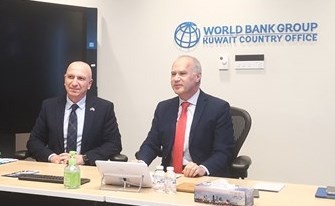Regional Director of the Gulf Cooperation Council countries at the World Bank, Issam Abu Suleiman, stressed that changing the social contract between the state and the citizen is not necessary to start economic reform, but rather it must be developed to be more beneficial to citizens, in conjunction with a comprehensive reform of the civil service system.
He said during a press conference yesterday that the welfare state should be a sustainable state as well, indicating that the current reforms are appropriate in the presence of large financial buffers, represented by the capabilities of the General Investment Authority and the reserves of the Central Bank, reports Al-Anba daily.
He pointed out that Kuwait is not financially weak and will not need to reduce the welfare of citizens in order to achieve reforms, but in the next few years, the state may suddenly force it.
He stated that the downgrading of Kuwait’s credit rating gave an important indication to the state of the need to carry out reforms to obtain financial sustainability for the state and benefit from the state’s capabilities, noting that Kuwait has great potential to attract foreign investment as it competes not only with the Gulf countries but the world as well.
He pointed out that the rise of oil price is very good for the Kuwaiti economy and has a positive impact on the balance of payments and the financial situation, as the decline in prices in the last two years has had a very negative impact on state revenues, which directly affected investments in the country, but the reform agenda in Vision 2035 will move economy, especially the development of the private sector.
In the long run, he said that Kuwait, like the rest of the Gulf countries, cannot rely on high oil prices, as it is in a continuous transformation, and in order for Kuwait to be immune to oil price changes, economic diversification is an important tool, in addition to diversifying revenues and the ways of spending those revenues, as It is noticeable that the salary section was higher than the state’s revenues.
Abu Suleiman believes Kuwait enjoys a large amount of spending on the educational sector, but its outputs are not at the required level, as the results of the tests are less than 400, while in other countries similar to it in terms of per capita income, it ranges between 500 and 570, indicating that despite the large volume of investment In education, however, its outcomes are disproportionate to prepare young people for future jobs.
He pointed out the importance of developing the quality of education and developing educational curricula in schools, as many countries have developed their curricula to suit current and future economic requirements. He stated that education in Kuwait and the Middle East cannot remain with the standards of 1960 and 1970, while the entire world is developing in a rapid manner that keeps pace with the skills required now and in the future, indicating that educational reform must be comprehensive, indicating that Kuwait urgently needs it, and has great potentials to achieve this. Abu Suleiman indicated that Kuwait will face great difficulty in diversifying its economy and reaching the 2035 vision if it does not have the human capital to achieve this.
In terms of financial and economic diversification, there is a great potential for Kuwait and the Gulf states to transform into a green economy, and this does not need many reforms. “We are talking about allowing the private sector and partnership projects between the two sectors to become part of the service providers in the country,” he said.
Meanwhile, Director of the World Bank office in Kuwait Ghassan Al-Khouja said the salary item announced in Kuwait’s budget for the fiscal year 2021/2022 was more than 12.6 billion dinars, while in 2005 it was about 1.8 billion dinars, and in 2013 about 4.8 billion dinars, meaning it increased by 1000% within 15 years.
He explained that the leadership positions occupied by Kuwaiti women constitute 17% in the public sector, pointing out that it is a very low level, especially since the number of working women is greater than men.























